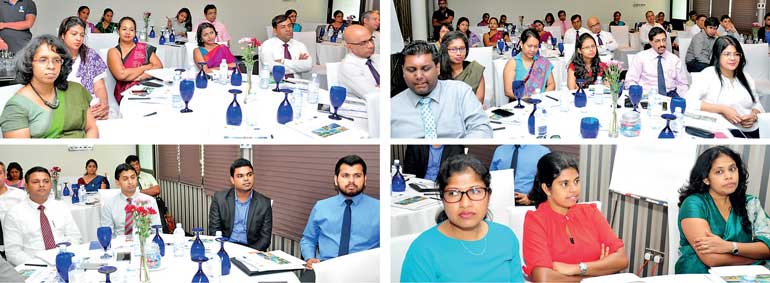Friday Feb 20, 2026
Friday Feb 20, 2026
Friday, 30 March 2018 00:00 - - {{hitsCtrl.values.hits}}

 By Shannon Jayawardena
By Shannon Jayawardena
The International Trade Centre (ITC) has organised a two-day training course from 26-27 March at the Galle Face Hotel with the aim of sharing facts and insights on formulating trade policy within a country.
The training is to provide an overview of trade defence measures available to counteract unfair trade practices while highlighting the critical issues of managing the different positions and requests proposed by the relevant group of stakeholders. Likewise it is aimed at transcending disciplinary boundaries to cover all aspects of trade, economics, law, public administration and political science.
EU-Sri Lanka Trade Related Assistance National Project Coordinator Dayaratna Silva said: “This program includes trade policy formulation, trade defence, challenges of liberalisation in various services which are all becoming increasingly relevant in today’s context. This is a major step forward in providing the space for the domestic industry to safe guard any possible unfair trade practices that may threaten the domestic or local industry.”
Silva stated that the objectives of this event are to enhance the understanding and capacity of public sector officers and private institutions in Sri Lanka, to have a conscious approach to international trade, focusing on the internal dynamics of building up a trade policy and overcoming the unavoidable divergences among different stakeholders.
Postgraduate Institute of Management (PIM) Senior Management Consultant Dr. Trevor Mendis said: “Trade policy can be defined as a set of regulations, controls and agreements which are related to the exchange of goods and services involved in international trade including taxes, subsidies, import/ export, promotion of international trade, unfair trade practices and trade policy instruments.”
Traditional trade instruments like tarries, non tarries, public sector policies, currency control, investment controls do exist but in a contemporary world, new aspects and new arenas are emerging and evolving. Objectives of a trade policy are trade liberalisation, creating a more outward orientated trade culture, increase market access to exports and export net growth, he noted.
“Change is very important but it cannot be done overnight. Global integration with enhanced economic efficiency is also very important. We have to improve our productivity that is vital.We have to identify our problems, constrains and gaps and then we have to formulate and adapt our policies. If we have a proper policy, we have a proper direction,” Dr. Mendis emphasised.
Private sector involvement is salient when it comes to proper policy implementation and has three dimensions which are active participation in multilateral trade negotiations to ensure position taken by government are business friendly, ensure private sector contribution to government trade policy formulation and private sector engagement at national, regional and international level trade policy, he noted.
The first day of the training course focused on trade policy making: formulating multi sectorial strategies, managing domestic audiences in trade policy formulation, trade defence measures and strategies in adopting trade defence measures.
The second day is to focus on services in trade liberalisation and regulatory reforms and is to conduct a roundtable discussion on selected trade policy issues with Italy, Milan Bocconi University Claudio Dordi, United Nations Former Director of Trade and Investment and Chief Economist for the Asia-Pacific Region Ravi Ratnayake, Department of Commerce Deputy Directors NalindaWijeratna and Lakmini Mendis, Shipper’s Academy Colombo CEO Rohan Masakorala and Ceylon Chamber of Commerce Chief Economist Shiran Fernando as panellists.
Pix by Lasantha Kumara